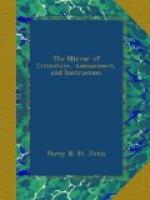* * * * *
FALL OF ROBESPIERRE.
It is well known, that during the revolutionary troubles of France, not only all the churches were closed, but the Catholic and Protestant worship entirely forbidden; and, after the constitution of 1795, it was at the hazard of one’s life that either the mass was heard, or any religious duty performed. It is evident that Robespierre, who unquestionably had a design which is now generally understood, was desirous, on the day of the fete of the Supreme Being, to bring back public opinion to the worship of the Deity. Eight months before, we had seen the Bishop of Paris, accompanied by his clergy, appear voluntarily at the bar of the Convention, to abjure the Christian faith and the Catholic religion. But it is not as generally known, that at that period Robespierre was not omnipotent, and could not carry his desires into effect. Numerous factions then disputed with him the supreme authority. It was not till the end of 1793, and the beginning of 1794, that his power was so completely established that he could venture to act up to his intentions.
Robespierre was then desirous to establish the worship of the Supreme Being, and the belief of the immortality of the soul. He felt that irreligion is the soul of anarchy, and it was not anarchy but despotism which he desired; and yet the very day after that magnificent fete in honour of the Supreme Being, a man of the highest celebrity in science, and as distinguished for virtue and probity as philosophic genius, Lavoisier, was led out to the scaffold. On the day following that, Madame Elizabeth, that Princess whom the executioners could not guillotine, till they had turned aside their eyes from the sight of her angelic visage, stained the same axe with her blood!—And a month after, Robespierre, who wished to restore order for his own purposes—who wished to still the bloody waves which for years had inundated the state, felt that all his efforts would be in vain if the masses who supported his power were not restrained




